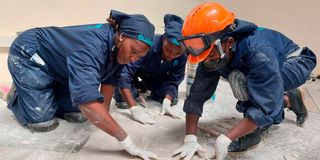Women severely underrepresented in construction, but that’s changing

Women trained in construction trade skills like painting, joiner and tiling, among others.
What you need to know:
- In nearly every construction site I encounter, the workforce is overwhelmingly male.
- The term ‘foreman’ is deeply ingrained in our collective lexicon, while phrases like ‘forewoman’ or the more inclusive ‘foreperson’ remain relatively uncommon.
Across the country, construction sites are a hive of activity, with the government’s ambitious affordable housing project leading the charge. Whenever I pass through these bustling sites, I can’t help but notice the workers clad in overalls, their faces dusted with cement powder as they push wheelbarrows brimming with mortar. Amidst this flurry of activity, one figure stands out – the foreman, barking instructions and overseeing the skilled artisans, or fundis, as they are commonly known.
Interestingly, in nearly every construction site I encounter, the workforce is overwhelmingly male. Rarely do I spot a woman among the fundis, save for the occasional food vendor. Historically, the construction industry has been a predominantly male bastion, a fact reflected in the terminology we use – the term ‘foreman’ is deeply ingrained in our collective lexicon, while phrases like ‘forewoman’ or the more inclusive ‘foreperson’ remain relatively uncommon.
While the underrepresentation of women in this field is a global issue, the challenges faced by women in this industry are particularly pronounced in Africa. This gender imbalance reflects a deeper, systemic issue within the construction sector. For too long, this industry has been perceived as a ‘man’s playground’, with women often relegated to peripheral roles or excluded entirely. The reasons for this disparity are multifaceted, ranging from societal norms and gender stereotypes, to a lack of equal opportunities and support systems for women seeking careers in this field.
Limited access to education and training opportunities, particularly in Stem fields, hinders women’s preparedness for technical roles. Furthermore, societal expectations and domestic responsibilities frequently clash with the demanding nature of construction work, making it difficult for women to balance their professional and personal lives. This gender imbalance not only perpetuates inequality but also deprives the industry of the valuable contributions and perspectives that women can bring to the table. However, times are changing, and more women are breaking into the industry, driven by their passion, determination, and desire to contribute to community development. Despite obstacles such as teenage pregnancies, early marriages, and societal pressures, many carved out their place in this male-dominated field.
Their stories are a testament to the power of perseverance and an unwavering commitment to pursuing their dreams. From the high school dropout who found her calling on a construction site, to the young mother who juggled parenting responsibilities while mastering the art of bricklaying, these women have shattered stereotypes and proved that no challenge is too great when met with an indomitable spirit. Through their journeys, they have not only acquired valuable skills and experience but have also become beacons of inspiration for others.
This week, we celebrate these trailblazers, exploring their unique paths and the lessons they have learned along the way. Their stories offer a candid glimpse into the challenges and triumphs that have shaped their lives, from navigating male-dominated workplaces to balancing family responsibilities with demanding careers. As we strive to create a more inclusive and equitable society, it is imperative that we challenge the deeply ingrained biases and stereotypes that have traditionally kept women on the sidelines of the construction industry.
The government can play a pivotal role by implementing initiatives that support and empower women in this field, including investing in educational programmes, vocational training, mentorship opportunities, and inclusive policies that promote gender equality and non-discrimination. This way, we can empower a new generation of women to take their rightful place alongside their male counterparts, ushering in an era of diversity and excellence in this vital sector.
Empowering women in the construction industry can have far-reaching benefits, contributing to the overall advancement of gender equality and sustainable development in the country.





